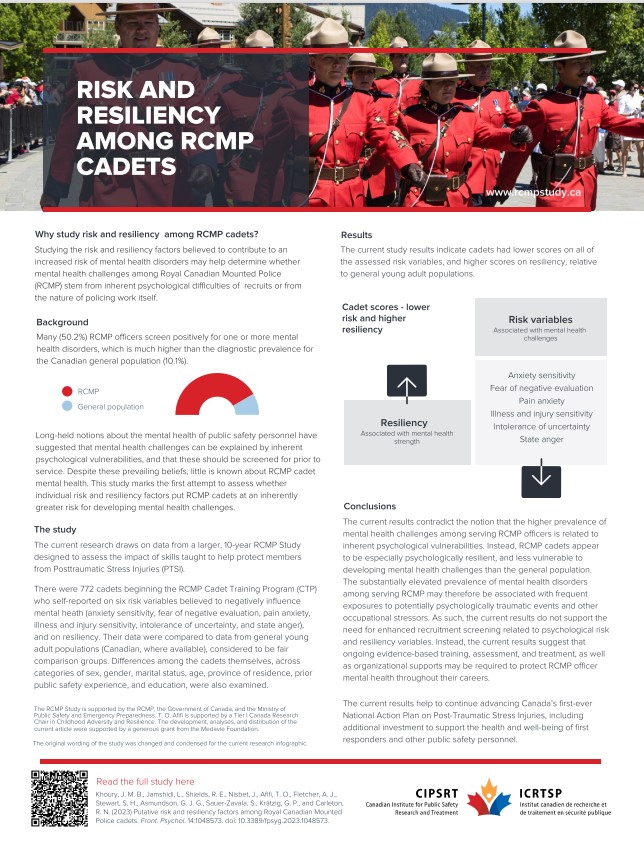Research Summaries
Why was the study done?
Approximately 50% of Royal Canadian Mounted Police (RCMP) officers screen positive for one or more mental health disorders, which is much higher than the diagnostic prevalence in the Canadian general population (10.1%).
Longstanding notions about the mental health of public safety personnel have suggested that mental health challenges can be explained by individual vulnerabilities, and that these vulnerabilities should be screened for prior to service. The current study marks the first attempt to assess whether RCMP cadets are inherently at greater risk of developing mental health challenges. By comparing cadet putative risk and resiliency scores – factors believed to contribute to or protect against an elevated risk of mental health challenges – to those of young adult populations, these data can help determine whether mental health challenges stem from inherent individual vulnerabilities or from the nature of policing work.
What was done in the study?
The current research draws on data from a larger, 10-year RCMP Study designed to assess the impact of skills taught to help protect members from Posttraumatic Stress Injuries (PTSI). A research summary of the previously published Study Protocol can be read here.
In the current study, 772 cadets beginning the RCMP Cadet Training Program (CTP) completed self-report measures of the following six putative risk variables: anxiety sensitivity, fear of negative evaluation, pain anxiety, illness and injury sensitivity, intolerance of uncertainty, and state anger, as well as on resiliency. These data were statistically compared to samples from Canadian, American, Australian, and European young adult populations. The international samples were used when Canadian published results were unavailable. Young adult populations were used in the comparison because the participating cadets were generally in their early twenties and unmarried, with relatively limited post-secondary education. The study also assessed for differences in risk and resiliency among the cadets themselves, across sociodemographic categories of sex, gender, marital status, age, province of residence, prior public safety experience, and education.
What did we find out?
The study results indicate cadets had lower scores on all putative risk variables, and higher scores on resiliency, relative to young adult populations. Among cadets, there were differences in putative risk and resiliency variables across sex and gender categories.
Where do we go from here?
These initial data will allow for further research comparing sociodemographic variables and risk and resiliency among cadets, as well as assessing for changes due to training and service.
The current results contradict the notion that the higher prevalence of mental health challenges among serving RCMP officers is related to inherent psychological vulnerabilities that can be screened out during recruitment. In stark contrast, RCMP cadets appear to be especially psychologically resilient and less vulnerable to developing mental health challenges than the general population. The substantially elevated prevalence of mental health disorders among serving RCMP may therefore be associated with frequent exposures to potentially psychologically traumatic events and other occupational stressors. As such, the current results do not support the need for enhanced recruitment screening related to psychological risk and resiliency variables. Instead, the current results suggest that ongoing evidence-based training, assessment, and treatment, as well as organizational supports, may be required to protect RCMP officer mental health throughout their careers.
The current results help to continue advancing Canada’s first-ever National Action Plan on Post-Traumatic Stress Injuries, including additional investment to support the health and well-being of first responders and other public safety personnel.
The RCMP Study is funded by support from the RCMP, the Government of Canada, and the Ministry of Public Safety and Emergency Preparedness. T. O. Afifi is supported by a Tier I Canada Research Chair in Childhood Adversity and Resilience. S. H. Stewart is supported by a Tier 1 Canada Research Chair in Addictions and Mental Health. The development, analyses, and distribution of the current article was made possible by a generous and much-appreciated grant from the Medavie Foundation.
The original wording of the study was changed and condensed for the current research summary.
Original study:
Khoury, J. M. B., Jamshidi, L., Shields, R. E., Nisbet, J., Afifi, T. O., Fletcher, A. J., Stewart, S. H., Asmundson, G. J. G., Sauer-Zavala. S., Krätzig, G. P., and Carleton, R. N. (2023) Putative risk and resiliency factors among Royal Canadian Mounted Police cadets. Front. Psychol. 14:1048573. doi: 10.3389/fpsyg.2023.1048573.
Prepared by K. Vincent.
